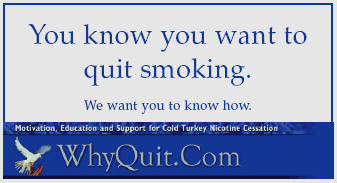
"How do I help a smoker quit smoking?"
"How do I help my son or daughter, husband or wife, mother, father, relative, best friend, neighbor, employees, patients, students or someone else stop smoking cigarettes?" "The Surgeon General claims that they face a 50% chance that smoking will kill them an average of 14 years early." "What can I do to help those I love stop now, while there's still time?"
 First, there are four bedrock principles that we need to accept:
First, there are four bedrock principles that we need to accept:
- They must quit smoking for themselves; they cannot do it for us. Otherwise a sense of self-deprivation is created, which grows with each challenge and guarantees defeat.
- Nicotine took their mind's priorities teacher hostage and has rewired their brain. They are dealing with true drug addiction in every sense and it's as permanent as alcoholism. Their hijacked brain is convinced that their next cigarette is as important as eating. Food craves, nicotine craves. Food dopamine "aaah" sensations, nicotine use "aaah" sensations.
- While dependency understanding is key to lasting freedom, most nicotine addicts know amazingly little about either their chemical dependency or how to permanently arrest it.
- Like a turtle drawing into its shell, when a drug addict feels threatened they become defensive, withdraw and any chance for meaningful communication is lost. They may still be standing in front of us but their protective denial barriers went up and they're no longer listening.
So if we can't make a smoker quit and are not experts or counselors on nicotine addiction, what can we possibly do or say that'll make a difference? Instead of forcing the turtle deep into its shell by badgering, yelling, begging, pleading or constantly reminding them that they're slowly killing themselves (a fact 81% of smokers openly admit), what can we do to help?
 Collectively, smoker survey data screams the correct answer. A 2005 Gallup Poll found that among smokers who smoke a half-a-pack to a full-pack daily that 90% consider themselves addicted and that 80%
want to quit. Among those smoking more than a pack-a-day, 93% consider themselves addicted. And it isn't like they're not trying. According to a 2007
survey by the U.S. Centers for Disease Control, 40% of current
daily smokers made a serious quitting attempt of at least 24 hours
within the past year.
Collectively, smoker survey data screams the correct answer. A 2005 Gallup Poll found that among smokers who smoke a half-a-pack to a full-pack daily that 90% consider themselves addicted and that 80%
want to quit. Among those smoking more than a pack-a-day, 93% consider themselves addicted. And it isn't like they're not trying. According to a 2007
survey by the U.S. Centers for Disease Control, 40% of current
daily smokers made a serious quitting attempt of at least 24 hours
within the past year.
So they know they're committing slow suicide, know that they're hooked, and are likely seriously trying to quit. What they don't know is how.
Think about it, what learning takes place during the act of slapping on a nicotine patch, sucking on a cappuccino flavored nicotine lozenge or chewing a piece of cherry flavored nicotine gum? What dependency recovery understanding occurs while swallowing a three-month supply of Chantix at a cost of $569? What learning flows from a day or two of hypnotic bliss, enduring acupuncture or laser therapy, paying $500 to be injected with a shot of the sea sickness medicine scopolamine or taking magic herbs? None, absolutely none!
Free stop smoking e-books such as "Freedom from Nicotine - The Journey Home" and "Never Take Another Puff" are high quality dependency recovery teaching tools that diminish fear by providing smokers with a road map to freedom. Both are available at WhyQuit.com. Our free e-books remove the mystery by teaching smokers what they're up against and how to prevail.
How does nicotine enslave the mind? What are the associations between withdrawal and anxiety, anger, time distortion, an inability to concentrate, sleep disruption, and weight gain, and how can each be minimized? What relationships exist between nicotine and alcohol, caffeine and vitamin C? What are crave episodes, how long do they last, and why is experiencing them a good thing, not bad? What is the Law of Addiction and why is it the most critical recovery lesson of all?
Consider printing, wrapping and gifting knowledge and understanding, the keys to enhancing success. Consider including a short note that simply says, "I love you!" It isn't necessary to wait for their birthday or the holidays. Two recent studies found that unplanned quitting attempts are twice as likely to succeed as planned ones.
You don't need to be there when they open your gift either. In fact, it's probably better if you're not. The less said the better. Let them feel that deciding to read it was a result of their desires not yours. Be patient. Give them time.
Reading the books yourself will position you to provide three months of quality support once they're ready. Once they do get going, never claim credit for their attempt but instead allow 100% of the victory to be theirs. They had their own dream of someday figuring all this out on their own. Let them live it.
Remember, knowledge is simply a tool. They're the ones putting it to work. As much as we'd like, we can't endure even a single crave anxiety episode for them. Let them to take pride in their accomplishment. Coming home is likely the greatest personal gift they've ever given themselves. Allow them to savor and enjoy it, while you inherit its fruits!
Five Additional Ways to Lead Smokers to Knowledge
1. Via E-Mail - Consider e-mailing smokers a link to www.WhyQuit.com while sharing a brief message to the effect, "I stumbled upon this web site that I hope you'll explore. As you'll see, it's loaded with free videos, articles, books and support. I debated sending you this link but then thought, what's the worst that can happen, that you'll be angry at me for caring?"
2. Hand Smokers Business Cards - Download and print WhyQuit business-type cards that you can give to smokers. There are eight different cards sharing WhyQuit's link and one of the following messages:
WhyQuit business-type cards that you can give to smokers. There are eight different cards sharing WhyQuit's link and one of the following messages:
- You know you want to quit smoking. We want you to know how.
- Can you imagine life without cigarettes? Does your answer to that question scare you?
- Know anyone who's died from smoking? Is that how you want to go?
- Free yourself from the chains of nicotine addiction.
- Find out what the tobacco and pharmaceutical companies don't want you to know. Quitting is easier than you think.
- Will you smoke that next cigarette because you want to or because you have to?
- Are you sick of being a slave to cigarettes? Knowledge is the key to
- freedom; and
- Quit smoking the easy way. Cold turkey. Find out how from people who have done it.
3. Hang Bulletin Board Internet Address Tear-Offs - Helen Webb in New Zealand developed a printed sheet of WhyQuit address tear-offs that are having great success on community bulletin boards in area businesses. Her flyer simply reads "Free Quit Smoking Education and Support at www.WhyQuit.com. Across the bottom of the sheet are 18 tear-offs or pull tabs that read www.WhyQuit.com. Helen's sheets are perfect for barber shops, beauty salons and for connecting with smoking patients in physician and hospital waiting areas.
4. Share Quitting Tips Handouts - WhyQuit offers a 14-page Nicotine Cessation Tips handout that you be printed and shared with smokers, oral tobacco users and the 40% of nicotine gum users that have become hooked on the cure.
5. Educate Your Physician About Nicotine Cessation - Amazingly few medical schools devote time to teaching new physicians how to counsel patients in quitting smoking. They've witnessed first-hand how dismal pharmacology has proven in helping their patients quit. Many have grown discouraged. Although the doctor's time between patients is at a premium, share your experience with the doctor's office manager. If you can, leave them with a copy of a quitting tips handout, a sheet of WhyQuit business cards, a bulletin board tear-off address sheet, and copies of one or both of our free books if you have sufficient printer ink and paper. Let them know that these materials can be freely shared with all smoking patients. Invite them to visit and explore WhyQuit and read our page for health professionals.
Related Questions and Articles
- How can I get someone to stop smoking when they don't want to quit? See: Can we help a person quit when they are pretty sure they don't want to quit?
- How to I motivate a person to want to quit smoking? See: Individual Approaches Used to Motivate Smokers to Quit
- Why won't my husband, wife, son or daughter quit smoking for me? Don't they love me? See: Quitting for Others
- Why won't my husband or wife stop smoking for our children? See: Obama Can't Quit Smoking for America's Youth
- When is the best time for a smoker to stop smoking? See: Want to quit smoking? Jump in the pool!
- What is the secret to stopping smoking? See: The Secret to Quitting Smoking
- How do I get my patients to give up smoking cigarettes? See: Patient Nicotine Dependency Recovery Resources for Medical Professionals
- How do I help students quit smoking? See: How to start your own school-based student stop smoking program.



